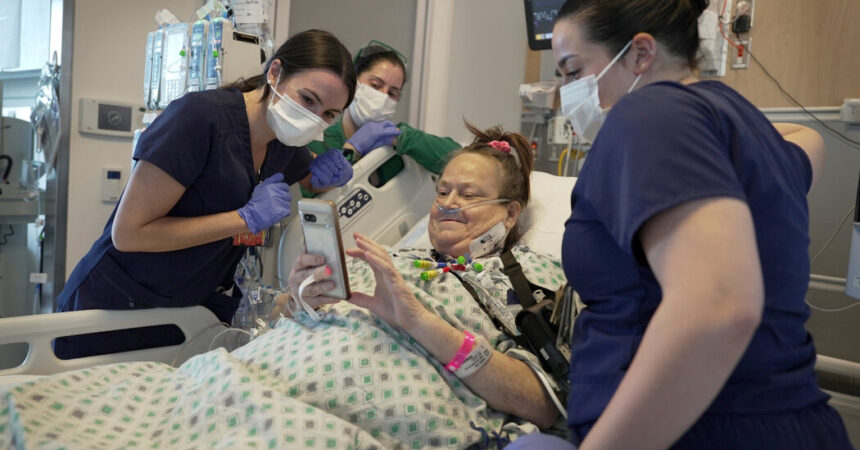A severely ill 54-year-old woman earlier this month became the second person to receive a kidney transplanted from a genetically modified pig, surgeons at NYU Langone Health in New York announced on Wednesday.
The patient, who had both heart failure and kidney failure, was given the organ on April 12, just eight days after receiving a mechanical heart pump. Surgical teams at NYU Langone carried out the two procedures over the course of nine days.
The kidney recipient, Lisa Pisano, a native of New Jersey, was at risk of dying without the heart pump, a medical device used in patients who need a heart transplant.
The kidney came from a genetically engineered pig provided by United Therapeutics Corporation, a biotech company. The pig carried a gene for producing a sugar called alpha-gal that had been “knocked out,” or blocked.
NYU Langone Health studies have shown that removing the gene reduces the risk of a severe immune reaction in a patient, which can lead to the immediate rejection of an organ transplanted from an animal, a process called xenotransplantation.
The NYU Langone surgeons also placed the pig’s thymus gland, which can reprogram the patient’s immune system so it doesn’t reject the pig’s organ, under the transplanted kidney in order to reduce the likelihood of rejection.
The woman, who might have died without the heart pump and was ineligible to receive human organs, which are scarce, because of her advanced disease, said in a statement issued by the hospital that she was eager to gain more time so she could see her grandchildren grow up.
“After I was ruled out for a human transplant, I learned I didn’t have a lot of time left,” Ms. Pisano said. “My doctors thought there might be a chance I could be approved to receive a gene-edited pig kidney, so I discussed it with my family and my husband.”
The first patient to receive a kidney transplant from a gene-edited pig was a 62-year-old man at Mass General Brigham in Boston, who underwent the procedure just last month. That patient, Richard “Rick” Slayman, has already been discharged from the hospital.
Ms. Pisano’s case is the first known instance of a patient with a heart pump, also called a left ventricular assist device, receiving an organ transplant of any kind, NYU Langone Health officials said. Kidney failure usually makes patients ineligible to receive a heart pump, because of the high chance of death involved.
The back-to-back surgeries were highly unusual, if not unprecedented, said Dr. Nader Moazami, chief of the division of heart and lung transplantation at N.Y.U. Grossman School of Medicine. He performed the heart pump surgery with Dr. Deane E. Smith on April 4.
“The unique approach is the first time in the world that left ventricular assist device surgery has been done on a dialysis patient with a subsequent plan to transplant a kidney,” Dr. Moazami said.
The xenotransplant, which is considered experimental, was cleared by NYU Langone’s Institutional Review Board and approved under the Food and Drug Administration’s compassionate use, or expanded access, program for patients with severe or life-threatening conditions.
Dr. Robert Montgomery, chair of the department of surgery and director of the NYU Langone Transplant Institute, led the kidney transplant operation. Dr. Montgomery did the first xenotransplant of a genetically modified pig’s kidney in September 2021, when he attached the organ to a brain-dead patient who was being sustained on a ventilator and demonstrated that the organ functioned and produced urine.
He has since performed four similar transplants, including one last year in which a brain-dead patient was monitored for 61 days.

